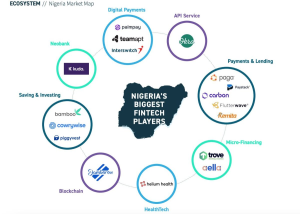
Introducing The World of (FinTech): It’s Impact on our Lives

Fintech technology is the latest innovation and the best advanced networking and technological system that has played a great role and impact on our daily lives of the vast human populations.
With the Introduction of Fintech also known as financial Technology in the 21th century, the term was initially applied to established financial institutions, such as banks.
In recent times, specifically in the last four years, 2018 to 2022, there was a shift there has been a shift in consumer-oriented service as delivered by Fintech now im different sectors and industries such as education, retail banking, fundraising and non-profit, investment management etc.
Take a moment to reminisce about your pre-Covid-19 life, when fintech played the role of an unsung hero during those less socially distanced nights.
On January 9, 2024, it was a new dawn in the world of technological innovations when over 50 international students under the G50 K-Academy from different countries and Nigeria attended the lecture of Director Song Kyung-yong of the Financial Supervisory Service of Fintech who lectured on the understanding of fintech.

Fintech primarily focuses on making financial services more efficient and accessible by leveraging on provided information technology, data analysis, blockchain, artificial intelligence, and other innovative technologies.
The Korean government has been in active support of the fintech industry operating in Korea by providing implementable policies like regulatory sandboxes and financial innovations for the ease of doing business.
Moreover, Fintech has boosted advanced technological infrastructure with a high internet penetration rate.
More importantly, Korea has adopted the use of fintech solutions, including mobile payments and digital banking services.
Fintech companies in Korea have not only made significant advancements in the digital banking sector but also witnessed a widespread use of mobile payment systems and digital wallets, supported by strong government and private sector backing.
They also play a notable role in the cryptocurrency space, with the country showing high interest and investment in blockchain technology and cryptocurrencies.
Substantial trading volumes take place on cryptocurrency exchanges. Lastly, major Korean corporations such as Samsung and Kakao, as big tech players, have played a crucial role in shaping the fintech landscape, leading the development of various financial services and products through their participation.
Key Point:
- The use of Electronic money and mobile payment services are actively taking place, offering consumers various payment options such as QR code payments and NFC technology.
- Additionally, peer-to-peer lending and crowdfunding are gaining prominence, providing opportunities for loans and investments bypassing traditional banks.
- Also with Examining the current state of fintech domestically and internationally, the fintech industry in Korea is experiencing explosive growth.

The Fintech industry in Nigeria primarily focuses on remittance services, mobile money services and digital banking now instrumental in providing financial services to previously underserved populations.
Mobile payments are widely used, with platforms like M-Pesa gaining popularity. Fintech companies leverage mobile technology to offer convenient and accessible financial services, facilitating domestic and international fund transfers.
Additionally, these companies provide innovative loan solutions to improve loan accessibility, address credit gaps through alternative data sources for credit assessments.
Through collaboration with traditional banks, fintech companies expand their influence and services, aiming to combine the agility of fintech startups with the stability of established banking institutions.
Back in Nigerian fintech companies strive to promote financial inclusion, navigate a complex regulatory environment, and efficiently regulate and foster innovation while maintaining viable environment for financial stability.
From 2023, Nigeria started experiencing significant growth in the fintech sector, emphasizing mobile payments, digital banking, cryptocurrency adoption, and the emergence of innovative startups.
The introduction of Qorepay fintech company is expected to further expand the potential of the Nigerian market, addressing issues by exploring the market and offering easy, secure, and affordable payments to enable all Nigerians to participate in finance.

Fintech Users
There are four broad categories of users for fintech:
- Business-to-business (B2B) for banks
- Clients of B2B banks
- Business-to-consumer (B2C) for small businesses
- Consumers
Top Reasons Consumers use Fintech
- Consumers seeking adoption look beyond their primary bank.
- Consumers are open to exploring financial services offered by non-financial service companies.
- Consumer adopters express a readiness to disclose their bank data to other organizations.
How do Fintech Companies make Money?
Fintech companies generate revenue through various methods aligned with their specific focus. Banking for instance, generate their income from fees, loan interest, and the sale of financial products. Investment apps may employ brokerage fees, payment for order flow (PFOF), or a percentage of assets under management (AUM).
Payment apps, may earn interest on stored cash and impose charges for premium features such as expedited withdrawals or credit card usage.
Have you have ever wondered why some aspect of your financial life was so unpleasant (such as applying for a mortgage with a traditional lender) or felt like it wasn’t quite the right fit, fintech probably has (or seeks to have) a solution for you, Fintech technologists will tell you.
Fintech companies overseen by the financial regulator prioritize strengthening cybersecurity to ensure secure transactions, not only transforms traditional financial markets but also moves towards providing consumers with innovative and convenient financial services.
Also with consideration of the global trend of digital transformation in financial institutions is also evident in domestic financial institutions, actively pursuing digital conversion.
This trend raises expectations for the emergence of more diverse and innovative fintech services in the future.
According to an article published on December 15, 2022, by Seoul’s Yonhap News Agency reporter Kim Hocheon, the Korea-Africa Foundation (KAF) held a commemorative event to activate digital economic cooperation with the Africa Fintech Network (AFN).
Both institutions plan to continue their collaboration to support activities such as information exchange, network expansion, and exchange between fintech companies in Korea and Africa related to digital economic cooperation between the two regions.
Through this collaboration, South Korea and Nigeria will have significant opportunities to cooperate and learn from each other in the fintech sector by Sharing Technology and Experience.
By collaborating in the fintech sector, South Korea and Nigeria can share the latest technology and experiences, helping each other address technological challenges and develop innovative solutions.
Facilitating Exchange of Expertise:
The Korea-Africa Foundation can promote exchanges among professionals possessing expertise and skills in the fintech field. Both countries can educate each other’s experts and learn applicable skills locally.
Creating Business Opportunities: Companies from both countries can form partnerships and explore opportunities to enter each other’s markets. Fintech collaboration can pave the way for exploring new business opportunities and building successful business models.
Strengthening Regulatory and Policy Cooperation: Fintech collaboration between the two countries can enhance mutual cooperation in regulatory and policy aspects.
Facing similar challenges, they can strengthen mutual support through collaboration in policy formulation and regulatory matters.
Through this exchange, Nigeria’s financial system is expected to undergo innovation and development, leading to enhanced financial inclusion.
The improvement of financial services through fintech technology has the potential to increase financial accessibility within Nigeria.
Therefore, through this collaboration, South Korea and Nigeria can leverage each other’s strengths to the fullest extent and contribute to the formation of a sustainable and innovative fintech ecosystem.
Written by Adelekan Oluwatimileyin Seun Theresa,
G50 K- Academy
Leave a Reply